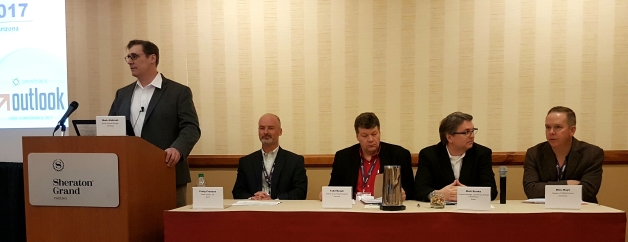Catching up to the ever-evolving technology game
PHOENIX, Az. – So many technological advancements are running rampant in the trucking industry today that it’s difficult to keep pace.
Omnitracs brought together a panel of four industry experts in their respective fields to attempt catch up to this technology onslaught, addressing a myriad of topics including big data, connected cities and vehicles, fuel, emissions and electric trucks, and, of course, autonomous vehicles, which has turned out to be a hot topic during Omnitracs Outlook 2017 in Phoenix.
Matt Starks, program manager for Eaton, said the path to autonomous trucks would be a process.
“You will see small steps in autonomous vehicle innovation,” Starks said, adding that a lot of steps can be taken between what we see now and the full integration of driverless trucks.
Wes Mays, director of OEM solutions for Omnitracs, said that although people generally drive their vehicles because they ‘love to drive,’ the world of truck driving is much different, particularly when it comes to the bottom line, pointing to the fact that one third of a company’s operating costs goes directly into its drivers’ pockets.
ABI Research has made the prediction that by the year 2030, there will be 11.4 million autonomous vehicles on US roadways.
Stepping back into the here and now, the panel also discussed fuel reduction measures, greenhouse gas emissions and the idea of an electric truck, which spurred Mays to proclaim that he believed the recently announced Nikola One truck, which boasts zero emissions, has an electric drive and is hydrogen powered, would revolutionize the trucking industry if it does what the manufacturing company says it is capable of.
The idea of connected cities and connected vehicles was addressed, with Craig Creason, IoT sales director for Sprint, describing how his company worked with the City of Kansas City to create ‘the world’s most connected city’ that provides features such as Wi-Fi in the two-mile downtown corridor, real-time data to deliver basic services to attract economic development, public visualizations of this data to see available parking, traffic flow and pedestrian hotspots and smart LED streetlights.
Sprint uses Wi-Fi and cellular data to connect the city’s downtown, and Creason said the city would use the current downtown model as a guideline to connect other parts of the city in the future.
Todd Mysak, business development and marketing director for Cummins, said connected vehicles was a way for his company to collect data and be able to tailor their service to a particular customer’s needs.
“We look at optimization,” Mysak explained, saying customers want help improving their costs and better maintaining their vehicles.
Starks added that connected vehicles could also enable a truck to perform based on driving conditions, changing how the engine or transmission functions based on weather and terrain.
Big data was also a big part of ‘the new trucking landscape’ discussion.
At present, a single truck produces one gigabyte of data per year, but estimates are for that number to drastically increase in the coming years.
Mysak admitted that Cummins used to have a bad habit of collecting all kinds of data and doing nothing with it, something he said had changed, as the focus now is providing value to its customers with the use of big data.
Creason said Sprint does a lot when it comes to data collection in the trucking industry, and that all this information should be used by companies to streamline their operations and become more efficient.
Mays was optimistic about what big data means to the industry and its benefit, but said he wasn’t sure what it will all look like when everything is said and done, adding that proper use of big data can help reduce driver turnover, collisions and increase uptime.
“The emerging trends are very significant and positive,” Mays said.

Have your say
This is a moderated forum. Comments will no longer be published unless they are accompanied by a first and last name and a verifiable email address. (Today's Trucking will not publish or share the email address.) Profane language and content deemed to be libelous, racist, or threatening in nature will not be published under any circumstances.